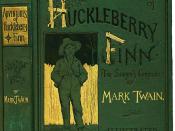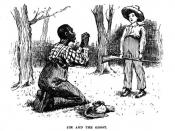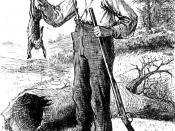On important theme within The Adventures Of Huckleberry Finn is the struggle between good and evil as experienced when Huck's personal sense of truth and justice come in conflict with the values of society around him. These occurrences happen often within the novel, and usually Huck chooses the truly moral deed.
One such instance occurs when Huckleberry realizes that he is helping a runaway slave. His moral dilemma is such that he is uncertain whether he should or should not turn this slave, named Jim, over to the authorities. Society tells him that he is aided a criminal, and that is against the law. However, he has grown quite attached to Jim, and is beginning to realize that Jim is a really good person. He would also never hurt him. This illustrates the concept and symbolism of Jim's freedom and societies influence on Huck.
At one point, Huck convinces himself that the nest opportunity he receives, he will turn Jim in, and clear his conscience.
The opportunity became available when slave hunters meet them on the river. Huck had an absolutely perfect chance to turn him over. However, he made up a story that his father was sick and needed help and asked the slave hunters for help. They immediately assumed that his father had smallpox, and he wanted nothing to do with Huck or his father. Thus, he had saved Jim, and actually felt good about it. Further along in the book, Jim becomes a slave again. Huckleberry, with the aid of Tom Sawyer, free's Jim. Once again, Jim's escape and freedom are more important to Huck than societies viewpoint.
The river is also important. The river is symbolic of freedom. It is also symbolic of good. When Jim and Huck are rafting down the river, they are free...


